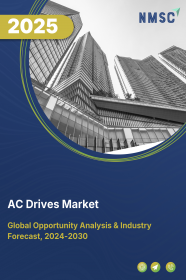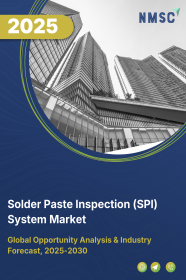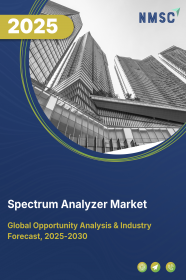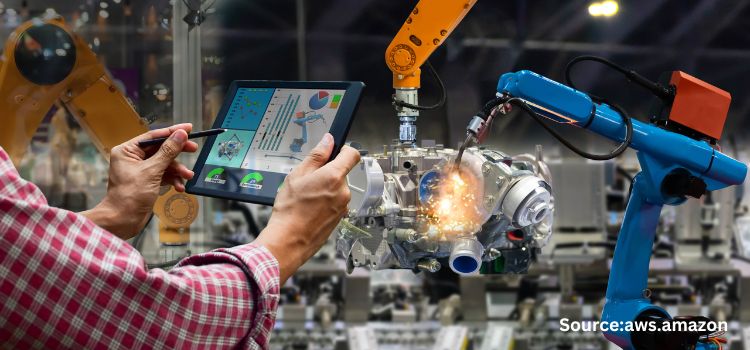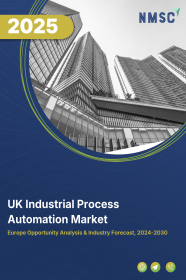
The UK Industrial Process Automation Market by Component (Manufacturing Execution System (MES), Distributed Control System (DCS), Programmable Logic Control (PLC), Supervisory Control & Data Acquisition (SCADA), Field Instruments, Industrial Robots, and Process Analyzers and Drives), and by End-User (Oil & Gas, Chemical & Refining, Energy & Power, Pulp & Paper, Metals & Mining, Pharmaceutical, Cement & Glass, and Others) – Opportunity Analysis and Industry Forecast, 2024–2030
Industry: Semiconductor & Electronics | Publish Date: 04-Feb-2025 | No of Pages: 110 | No. of Tables: 77 | No. of Figures: 42 | Format: PDF | Report Code : SE990
US Tariff Impact on UK Industrial Process Automation Market
Trump Tariffs Are Reshaping Global Business
The UK Industrial Process Automation Market Overview
The UK Industrial Process Automation Market size was valued at USD 4.76 billion in 2023, and is predicted to reach USD 6.68 billion by 2030, at a CAGR of 4.4% from 2024 to 2030.
The industrial process automation market refers to the industry that provides technologies and systems designed to monitor, control, and optimize industrial operations. It involves the integration of advanced computer technology, hardware, and software solutions to automate key processes such as inventory management, manufacturing, production, and quality control.
The key technologies include sensors, programmable logic controllers (PLCs), human-machine interfaces (HMIs), and supervisory control and data acquisition (SCADA) systems. This market serves industries such as oil and gas, chemical processing, food and beverage, and pharmaceuticals, where automation is crucial for improving operational efficiency, product quality, and workplace safety.
By reducing costs and minimizing human error, industrial process automation market enables companies to streamline their production processes, ensuring higher output with greater precision. The demand for industrial process automation solutions continues to grow as businesses seek to enhance productivity and remain competitive in an increasingly automated global manufacturing environment.
Innovation in Chemical and Pharmaceutical Sectors Drives Automation Growth
The chemical and pharmaceutical sectors in the UK are experiencing rapid growth and innovation. To address the rising UK industrial process automation market demand for end products and the ongoing shortage of skilled workers, these industries are increasingly adopting process automation strategies. Automation solutions, including collaborative robots, SCARA robots, and delta robots, are particularly effective in packaging applications within pharmaceutical production.
These robots are renowned for their speed and ability to handle small and lightweight objects, making them ideal for streamlining logistics operations. As these industries continue to expand, the demand for advanced automation systems is expected to increase, driving further UK industrial process automation market growth.
The Expanding Automotive Sector Boosts the Market Growth
The automotive sector plays a major role in the nation's automated manufacturing landscape. To ensure operational efficiency, many automakers are incorporating process automation solutions into their production facilities. With the rising trend of transitioning from traditional vehicles to electric vehicles (EVs), there is an increasing need for advanced automation technologies. This shift is expected to drive further demand for automation solutions within the automotive industry, as manufacturers seek to enhance production processes and meet evolving market needs.
Lack of Standardization Hinders the Growth of Industrial Process Automation Market
The lack of standardization is a major challenge that can limit the growth of the industrial process automation market. Without common standards, vendors may develop proprietary systems that are hard to replace or upgrade. This can result in vendor lock-in, where companies become dependent on a specific vendor’s technology, restricting their ability to switch to other vendors.
Vendor lock-in often leads to increased costs, reduced flexibility, and less innovation, that negatively affect market growth. Companies might hesitate to invest in automation systems if they are worried about being tied to one vendor’s technology, further slowing the UK industrial process automation market expansion.
Industry 4.0 Technologies Paving the Way for Future Automation Opportunities
The advancements in industry 4.0 technologies, such as the Internet of Things (IoT), cloud computing, and artificial intelligence (AI), are opening up significant opportunities for the industrial process automation market. These technologies allow companies to gather and analyze large amounts of data in real-time, offering valuable insights into their operations and highlighting areas for improvement. As technology evolves quickly, market participants are partnering with tech-focused companies to create new solutions based on established technologies.
Competitive Landscape
Several key players operating in the UK industrial process automation industry include Siemens AG, Honeywell International, Schneider Electric, Mitsubishi Electric, Rockwell Automation, Emerson Electric Co., ABB Ltd., Omron Corp., Fanuc Corp., Toshiba Corp., and others.
The UK Industrial Process Automation Market Key Segments
By Component
-
Manufacturing Execution Systems
-
Hardware
-
Software
-
Services
-
-
Distributed Control Systems
-
Hardware
-
Software
-
Services
-
-
Programmable Logic Control
-
Hardware
-
Software
-
Services
-
-
Supervisory Control and Data Acquisition (SCADA)
-
Hardware
-
Software
-
Services
-
-
Field Instruments
-
Industrial Robots
-
Process Analyzers & Drives
By End-User
-
Oil & Gas
-
Chemical & Refining
-
Energy & Power
-
Pulp & Paper
-
Metals & Mining
-
Pharmaceutical
-
Cement & Glass
-
Others
Key Players
-
Siemens AG
-
Honeywell International
-
Schneider Electric
-
Mitsubishi Electric
-
Rockwell Automation
-
Emerson Electric Co.
-
ABB Ltd.
-
Omron Corp.
-
Fanuc Corp.
-
Toshiba Corp.
REPORT SCOPE AND SEGMENTATION:
|
Parameters |
Details |
|
Market Size in 2023 |
USD 4.76 Billion |
|
Revenue Forecast in 2030 |
USD 6.68 Billion |
|
Growth Rate |
CAGR of 4.4% from 2024 to 2030 |
|
Analysis Period |
2023–2030 |
|
Base Year Considered |
2023 |
|
Forecast Period |
2024–2030 |
|
Market Size Estimation |
Billion (USD) |
|
Growth Factors |
|
|
Companies Profiled |
10 |
|
Market Share |
Available for 10 companies |
|
Customization Scope |
Free customization (equivalent up to 80 working hours of analysts) after purchase. Addition or alteration to country, regional, and segment scope. |
|
Pricing and Purchase Options |
Avail customized purchase options to meet your exact research needs. |

















 Speak to Our Analyst
Speak to Our Analyst



